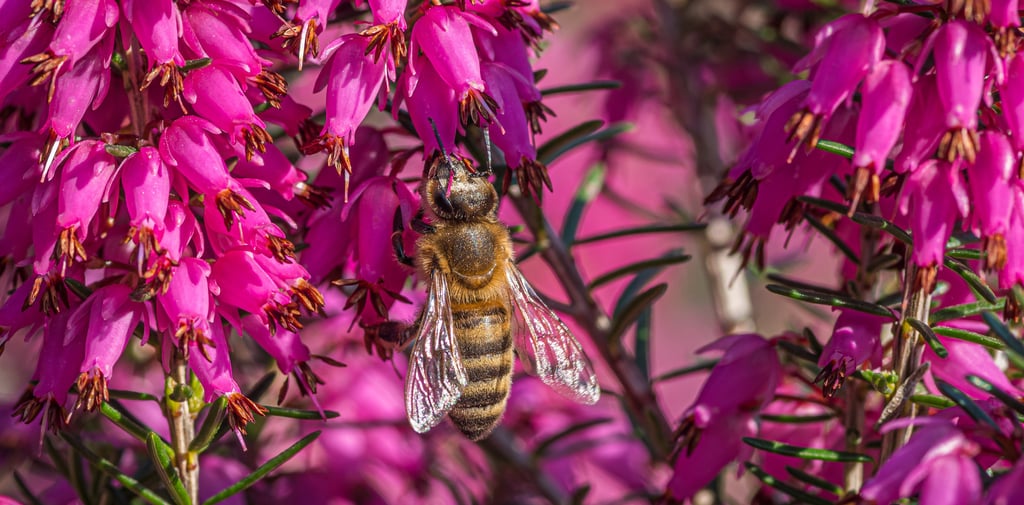The Benefits of Native Bees for Gardens and Farms
Discover the vital role native bees play in pollinating gardens and farms. Learn about their benefits, unique behaviors, threats they face, and how you can support these unsung heroes of the ecosystem.


When most people think about bees, the first thing that comes to mind is the familiar European honeybee (Apis mellifera). While honeybees are certainly important pollinators, there is a diverse group of native bees that play a crucial role in the health of our gardens and farms. In this article, we will explore the numerous benefits of these unsung heroes and why it's essential to protect and encourage their presence.
What are Native Bees?
Native bees are species that have evolved and adapted to specific regions over thousands of years. Unlike the non-native honeybee, which was introduced to North America by European settlers, native bees are indigenous to the continent. These bees come in a variety of shapes, sizes, and colors, with some species being solitary while others are social.
The Importance of Native Bees for Pollination
One of the most significant benefits of native bees is their role in pollination. Pollination is the process by which pollen is transferred from the male part of a flower to the female part, enabling fertilization and the production of fruits and seeds. Without pollinators, many plants would struggle to reproduce, leading to a decline in biodiversity and food production.
While honeybees are efficient pollinators, native bees have evolved to pollinate specific types of plants more effectively. This specialization is due to their varied sizes, behaviors, and preferences, which allow them to access different flower shapes and structures. For example, some native bees are better at pollinating tomato plants, while others excel at pollinating blueberries or squash.
Enhancing Crop Yields and Garden Productivity
By ensuring efficient pollination, native bees contribute significantly to the productivity of gardens and farms. Studies have shown that the presence of native bees can increase crop yields by up to 60% in some cases. This increased productivity translates into higher crop yields, better quality produce, and ultimately, greater profitability for farmers and gardeners.
Additionally, native bees can help to diversify the types of crops that can be grown in a particular area. As different bee species pollinate different plants, a diverse bee population can support a wider variety of crops, leading to increased biodiversity and resilience in agricultural systems.
Promoting Ecosystem Health and Biodiversity
Native bees are not only essential for pollination but also play a vital role in maintaining the health of entire ecosystems. By facilitating the reproduction of various plant species, they contribute to the preservation of biodiversity, which is crucial for the stability and resilience of ecosystems.
Furthermore, native bees interact with other organisms in complex ways, forming intricate food webs and supporting a diverse array of wildlife. For example, many bird species rely on the seeds and fruits produced by plants pollinated by native bees for their diets.
The Unique Behavior and Biology of Native Bees
Native bees exhibit a fascinating range of behaviors and adaptations that make them unique and valuable members of the ecosystem. Some species, such as mason bees and leafcutter bees, are solitary, with each female building her own nest and providing for her offspring. Others, like bumblebees, live in small colonies and exhibit complex social structures.
Many native bees are also better adapted to local climates and environmental conditions than honeybees. For instance, some species are active early in the spring or late in the fall, when honeybees are less active, ensuring continuous pollination throughout the growing season.
Threats to Native Bee Populations
Unfortunately, native bee populations are facing numerous threats, including habitat loss, pesticide use, climate change, and disease. As natural landscapes are converted for agricultural or urban development, native bees lose their nesting and foraging habitats, putting their survival at risk.
Pesticides, particularly neonicotinoids, can have devastating effects on bee populations, affecting their ability to navigate, reproduce, and forage. Climate change is also altering the timing of plant flowering and bee emergence, disrupting the delicate synchronization between these two groups.
Protecting and Supporting Native Bees
To ensure the continued benefits of native bees, it is essential to take steps to protect and support their populations. Here are some ways gardeners, farmers, and communities can help:
Create Bee-Friendly Habitats: Provide nesting sites and a diverse range of flowering plants that bloom throughout the growing season. This can include leaving bare soil patches, installing bee houses or nesting blocks, and planting native wildflowers.
Reduce Pesticide Use: Opt for organic or sustainable pest management practices whenever possible. If pesticides are necessary, choose bee-friendly products and apply them carefully, following label instructions.
Support Local Conservation Efforts: Get involved with local organizations and initiatives that focus on native bee conservation and habitat restoration.
Educate Others: Spread awareness about the importance of native bees and their vital role in our ecosystems. Share information with friends, family, and community members.
Conclusion
Native bees are essential partners in sustaining productive gardens and farms, as well as maintaining healthy ecosystems. By recognizing and protecting these unsung heroes, we can ensure a future where our landscapes remain vibrant, our crops thrive, and our ecosystems remain resilient. Embracing and supporting native bee populations is not only beneficial for our immediate needs but also for the long-term well-being of our planet.
#beekeeping #bees #honeybees #apiculture #backyardbeekeeping #savethebees #pollinators #honeyharvest #beekeepersofinstagram #beekeepinglife #apiary #honeycomb #raisingsweetbabies #flowertobee #beeswax #queenspotting #beevenom #propolis #beepackages #splittyourcolony #honeybee #beehive #beekeepingtips #beefriendly #beeremoval #beerescue #beekeeperslife #beekeeper #naturalbeekeeping #beeproducts #honeylove #rawhoney #manukahoney #beeraining #thebeeline #beebusy #buzzybees #bzzzz #beehiveinspection #beehouses #queenbee #workerbees #sustainablebees #beekeepingjourney #beekeepingseason #nycbees #labees #chicagobees #houstonbees #phoenixbees #phillybees #sandiegobees #dallasbees #austinbees #jacksonvillebeekeepers #fwbees #clebees #charlottebees #detroitbees #memphisbees #denverhoneybees #dcbees #bostonbees #nashvillebees #seattlebees #baltimorebees #pdxbees #okchoneybees #vegasbees #tucsonbees #fresnobees #sacramentobees #lbbeekeepers #kcbees #atlantabees #raleighbees #miamibees #minniebees #tulsabees #wichitabees


